Introduction
- Human resources management is required to ensure that resources are well managed in a project; project management is the process through which projects are initiated, implemented, managed, and controlled for a successful project goals and objectives attainment; the process has time and costs framework that it must meet.
- To fulfill the frameworks of project management, human resources are required at managerial and project members level. They need to be managed effectively and motivated to work for the benefit of the project.
An effective project must undergoes a full cycle of project management which are planning, organizing, securing and managing resource; the cycle is the same in different projects but follow each other in a chronological order. Developing an efficient team is the role of management that starts from planning human resources all the way to appraisal, motivation, rewards and ends with termination of the employment contract.
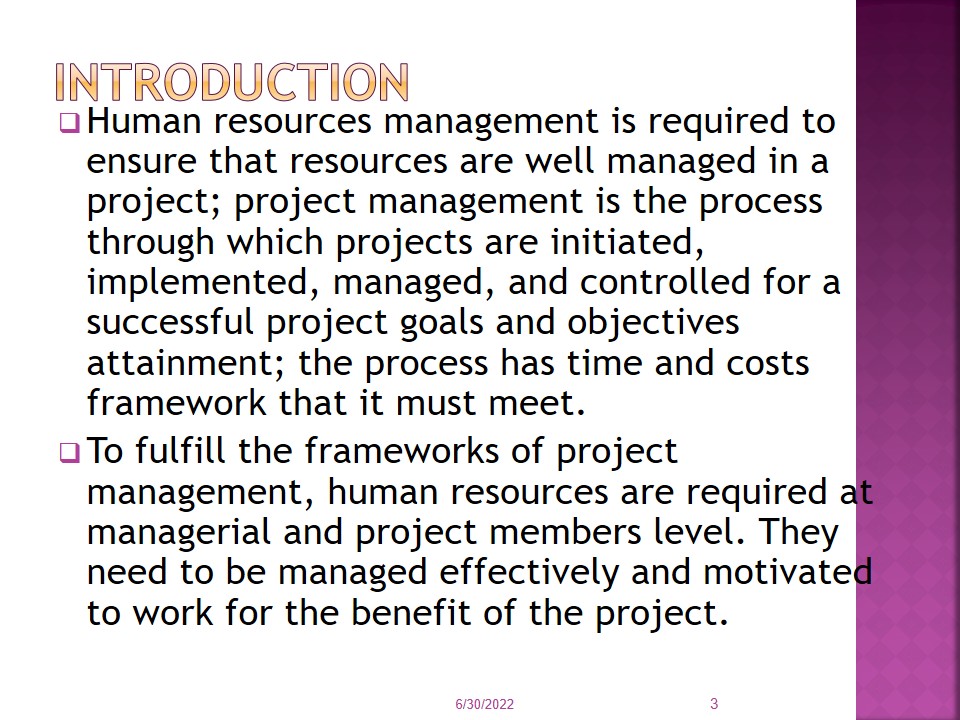
Human resources management in project
A successful project requires to have able, well trained employees, they should have the experience, the professional knowledge as well as the right attitude to see the project successes.
An organisations human resources has the role of extending their services to project management however project leaders have the main role of motivating project employees (Lewis, 2004).
When developing a project management team, the managers must look for the right combination of people who have the mandate of seeing the project a success, the right combination is in the form of experiences, age, professionalisms, capacity and attitude.
After coming up with the team, the next crucial thing is to ensure that the team has been motivated to operate in the right way, there should be a combination of motivation that need to be implemented (Lewis, 2004).
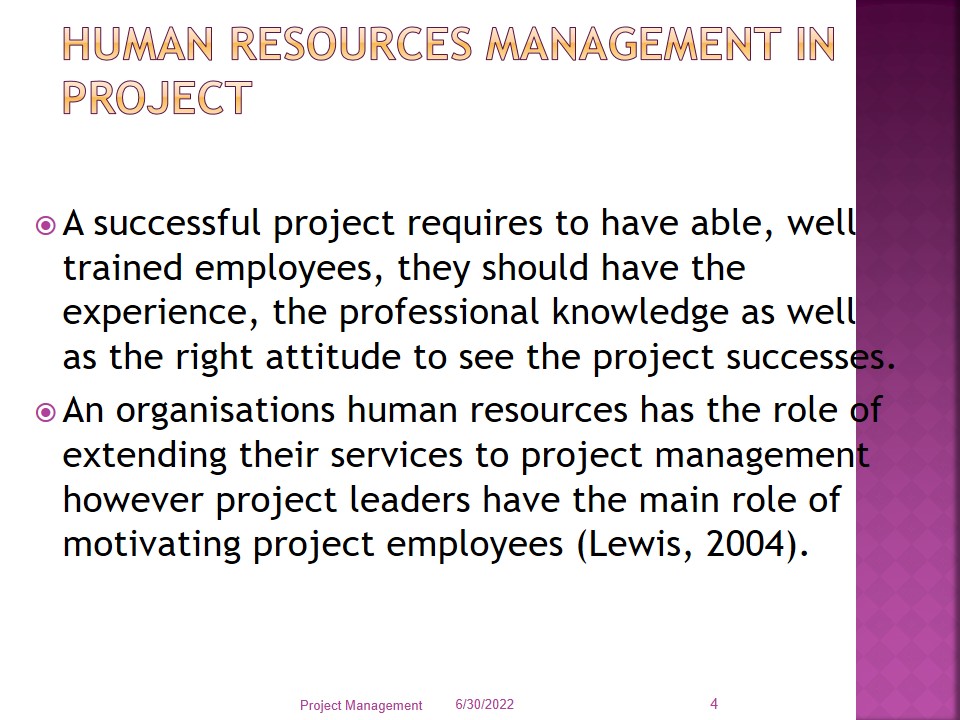
Motivation in Project Management
- Motivation is the inner drive an individual has; it makes him persevere to attain set goals either in life or in an organization. People have different personalities and so are they motivated by different things.
- Team members should be motivated to facilitate their attainment of the project goals and objectives, the motivation in the case of project is special in that it should be different form the normal motivation adopted across the company.
- An effective human resources management ensures that there are motivational policies set in their company, the main aim of having these policies is to ensure that the organisation has the human capital willing to produce results.
- to motivate a project team effectively, the human resources manager should work in close collaboration with project managers, they should come-up with policies that improve the enthusiasm of project workers.
- The most common method that motivates employees is provision of good working environment as well as paying the employees effectively. Issues of how much the employee will be paid can be handled by the human resources however project managers have a wider role of creating a favorable working environment.
- When employees are motivated, their outputs is increased.
Motivation is a continuous process; attainment of one goal leads to another goal and a different motivational system. A motivation system/process is a combination of variable with the expected end result as an increased enthusiasm and morale in once work. Human resource department is mandated with this task, however, it spans more that human resources.
A motivation system/process is a combination of variable with the expected end result as an increased enthusiasm and morale in once work. Human resource department is mandated with this task; however, it spans more that human resources. The way an organization is structured, the kind of organization culture adopted, power distribution and employees relations are variable of motivations. Employees may be motivated by internal and external stimulus.
The way an organization is structured, the kind of organization culture that an organization has, power distribution and employees relations are all variable of motivations. Employees may be motivated by internal and external stimulus. Motivation can be said to be an altruistic approach to respecting human dignity, but more are the benefits that accrue to an organization. research has shown that a well motivated team lead to high employee productivity and an increased customer satisfaction. Job performance is considered as a function of motivation and ability.
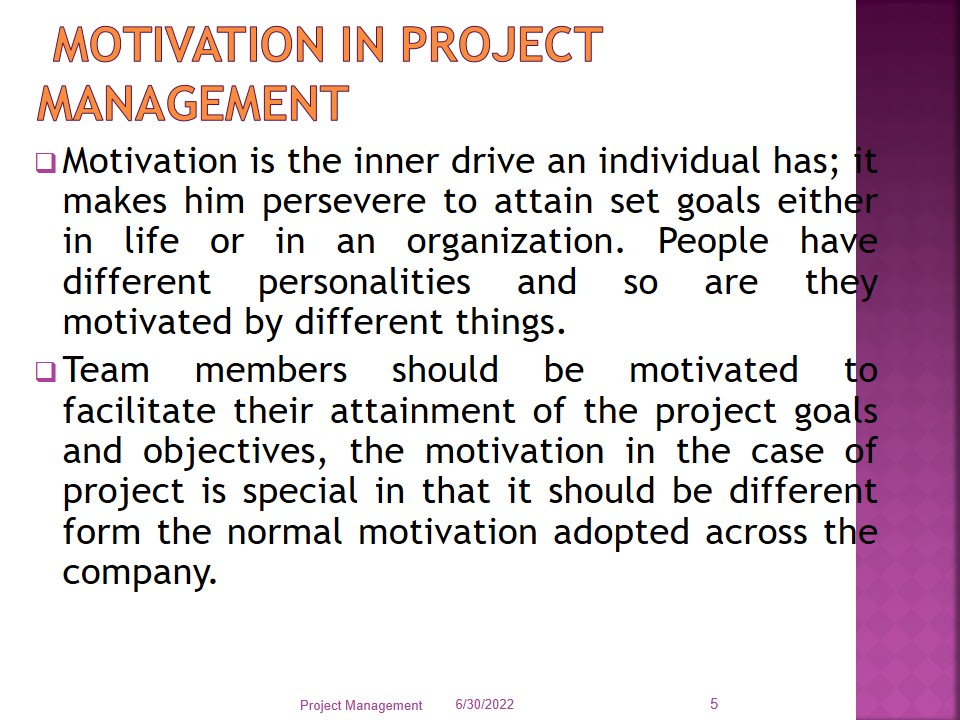
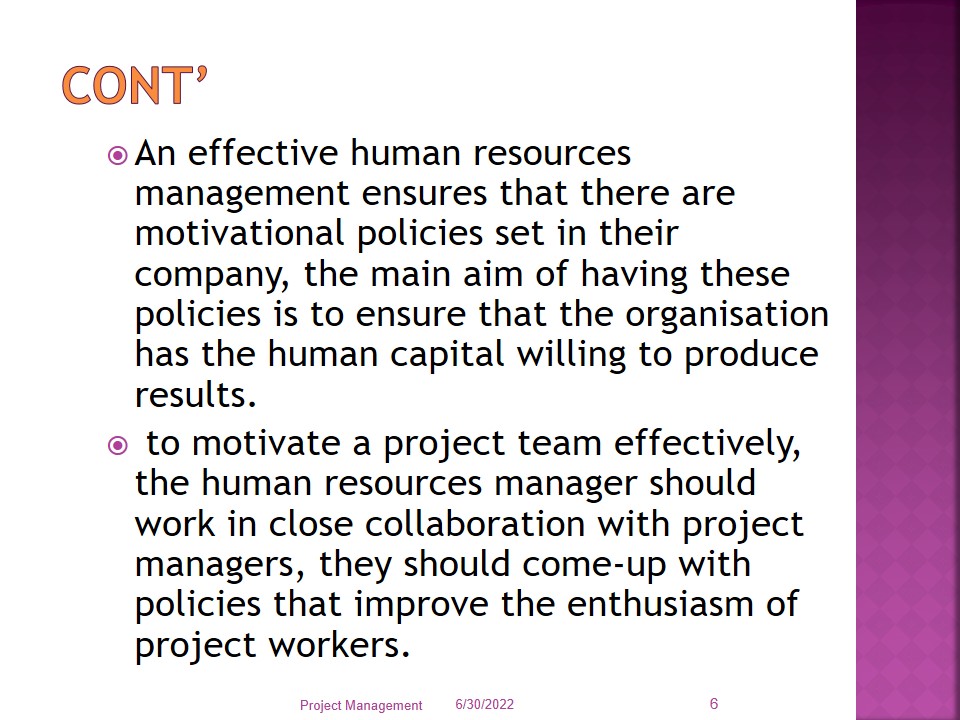
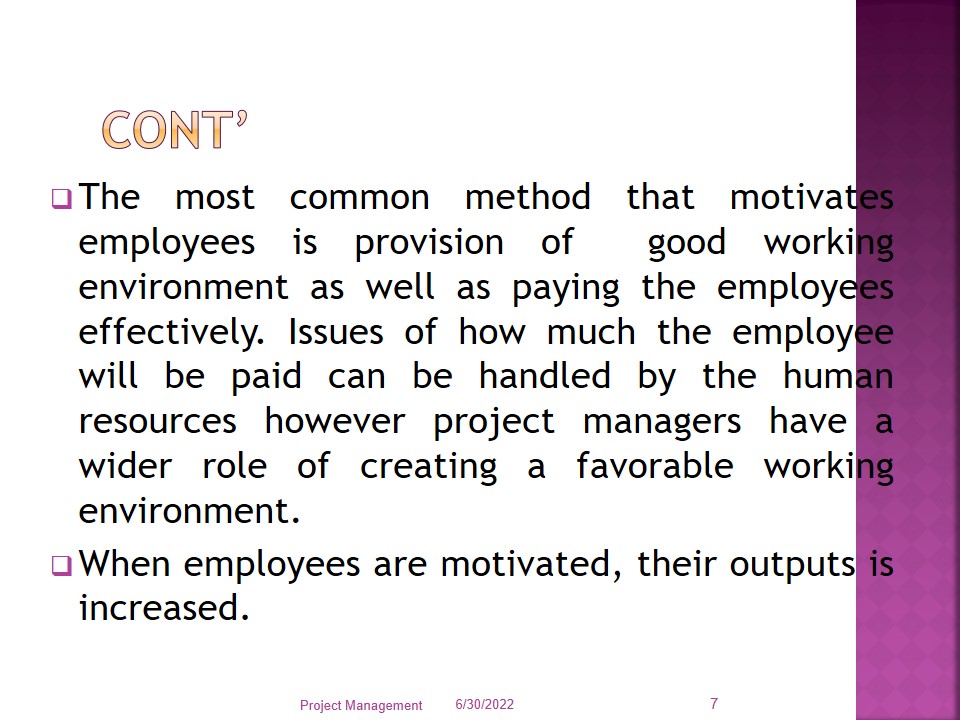
Project management team
- To effectively manage and implement a project, there is need to have a team of experienced and motivated team.
- Team that is motivated is creative and willing to come up with ways that can be used to meet the objectives of the project. Managers when in the planning stage have the role of coming up with the right combination in the terms of age, attitude, experience and the professionalism.
For an effective operation, organizations, whether in service, products, public or private entities, need physical and human resources; scholars in strategic business management have agreed that human resources are the greatest asset that an organization can have; without which no business transaction can take place; thus they need to be motivated to give satisfying results.
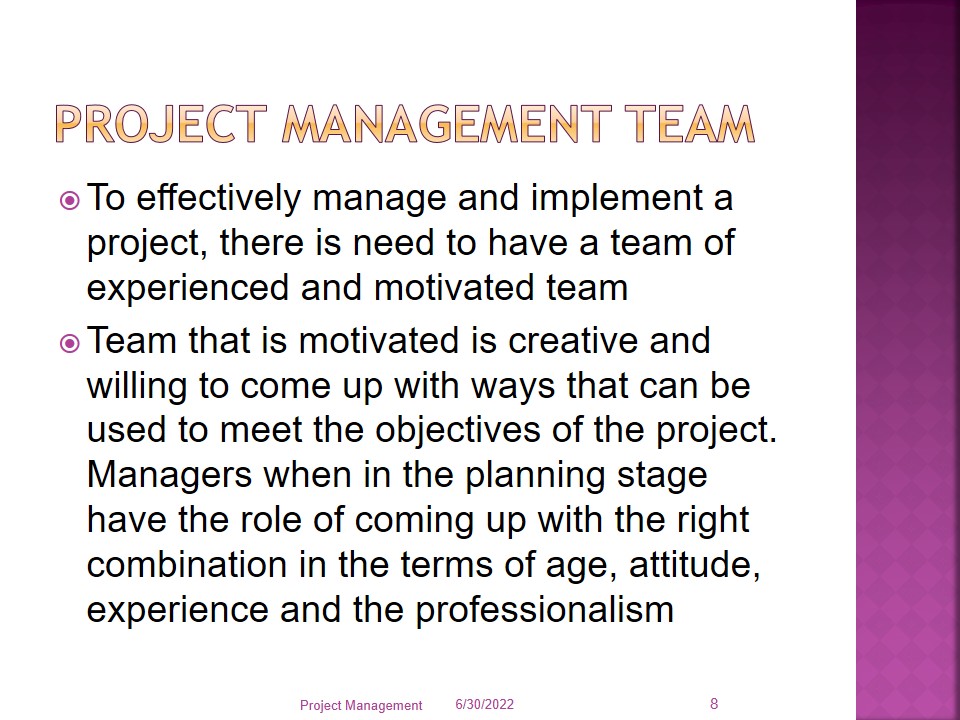
Theories of motivation
- Scholars in human resources have developed different theories of motivation, none of the theory work in isolation however they all have some elements of each other.
- In project management, the human resources and the project leader have the role of establishing the best approach they can use. The theories include:
Traditional Theories X and Y
- Traditional theory X was developed by Sigmund Freud; in the theory the philosopher stated that people are generally lazy, they hate working. In the theory the assumption is that people only want security and if they have to work, they have to be rewarded. Rewarding must be appropriate to meet the peoples need.
- To attain the goals of project, measures are supposed to be put in place to enhance working of employees, if the employees are left on their free will, they are likely not to work.
- Theory Y which was developed by Douglas McGregor, is in contrast with Sigmund’s theory. He was of the opinion that people generally are hard working and enjoy to earn a living through working hard. In this theory the drive that people have in internal, they have a self drive, self motivated and are creative to make better ways of making their work easy.
- The theory give project managers the role of understanding their teams wells an ensure that those people who have self drive are given the chance to exercise the drive, they should be given,
- Tasks that need less supervision as their self drive is the source of power.
- In the case of a team that has people who tend to be more on theory X, then management has the role of ensuring that at all times, the employees are kept on their toes to ensure they perform.
Abrahams Marlow
- Abraham Marlow (1908-1970), developed a motivational theory called Hierarchy of Needs. Robbins and Coulter (1998), generalised the hierarchy of need as brought about by Marlow theory into five levels;
- Psychological needs; these are the basic needs that a person should have they are food, shelter, health and clothing.
- Safety need; after one has been satisfied of his psychological needs, he feels insecure with life. He realizes that he needs protection.
- Social / Belonging; this is the sense of belonging, a person need to feel as a man of the people and recognised with a certain group.
- Esteem; after the above has been attained, the next stage self love. This is called self esteem.
- Actualisation this is the point that one is more concerned about how the outside world is seeing him, he is more contented with what he has attained in life.
Depending with the need of project staffs, the human resources should fulfil the needs.
In the efforts of understanding what motivates employees, there are different theories developed. The start point of all theories is to understand how human mind react. What stimulates an individual. Despite that human beings have different personalities, all theories are in the view that there are similar attributes that make human kind and if an organization management understand these attributes, motivating its employees is easy.
Leaders have a role to play in motivation, they should create a good working environment that all employees will feel comfortable and willing to work in. decisions made in an organization determines the direction of the organization, the quality of decision will be of essence in motivation in the organization. Motivation is a continuous process; attainment of one goal leads to another goal and a different motivational system. A motivation system/process is a combination of variable with the expected result as an increased enthusiasm and morale in once work.
Managers in such a society that tend to have character of theory Y only need to monitor but not control employees. Creativity and innovation is facilitated by creating a better working environment. Reward system is seen as an additional motivator to a person perform his/ her duty.
Theory x although among the oldest is still applicable in today’s organization to certain degree. People can be trusted with certain tasks although control should be injected to ensure that they don’t surpass the mandate and powers they are given. For example in a computerized organization, managers should give rights of access to the system; however the rights should be limited.
When the two theories are combine together, they result to an organisation that have elements of either the theory, they bring aboard different issues;
Theory x + Maslow’s = need for motivation + meeting ones needs according to the level
Theory Y + Maslow’s = self motivation + meeting of one’s needs
In the lower stages of Maslow’s theory, the main motivator is money. This goes in line with the general believe of theory X which is of the opinion that a person must be given an external push to perform.
Combining the two theories will thus give rise to an organization that is sensitive to ones needs (employer is sensitive of the need of employees, and employees are sensitive of the needs of employer).Good Motivational system leads to positive organizational behavior; employer and employee find each other as partners. They are responsible of each other and wok for mutual benefit. Change, innovation and creativity are encouraged and working environment is favorable.
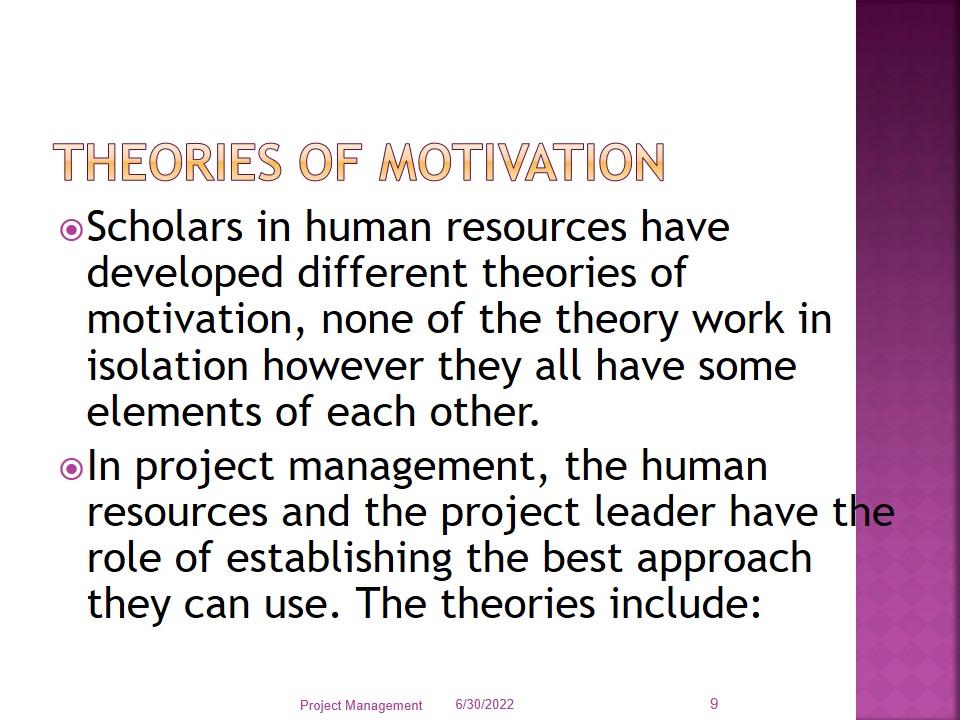
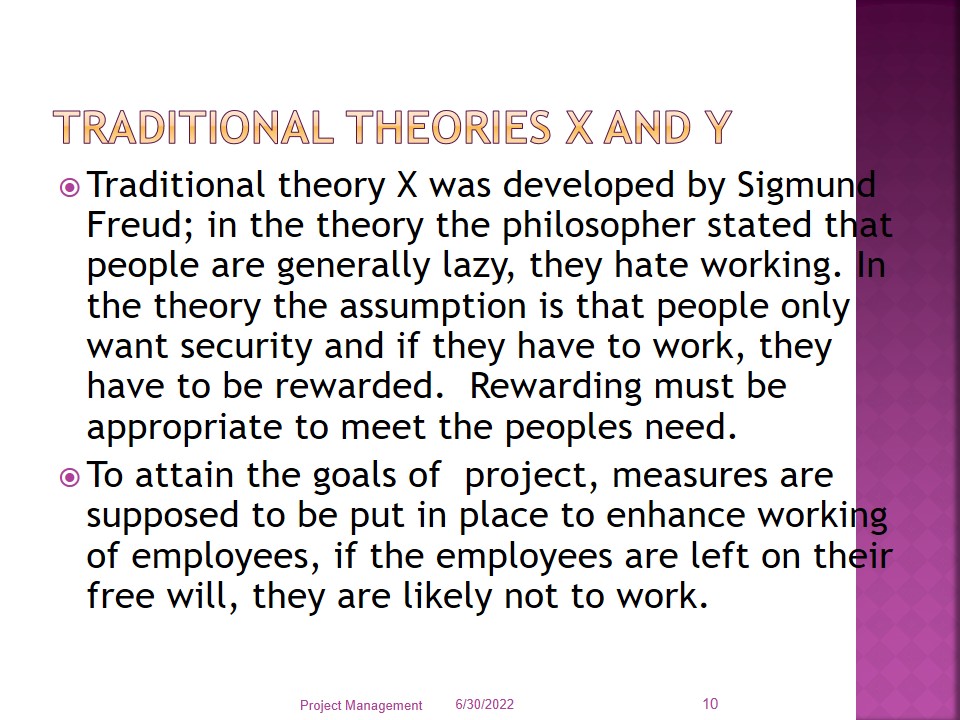
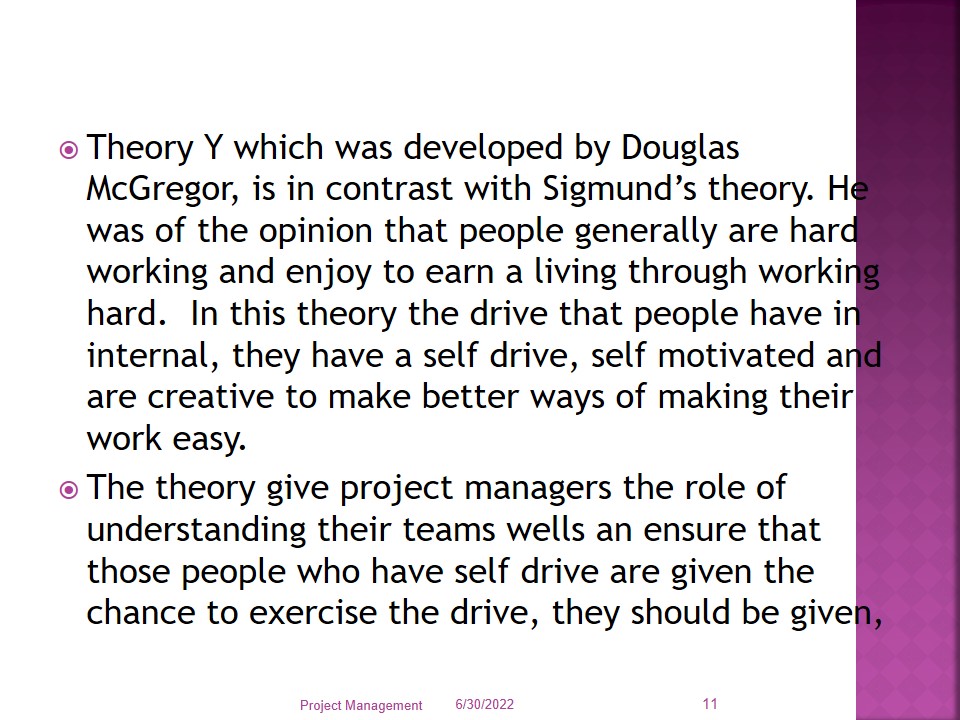
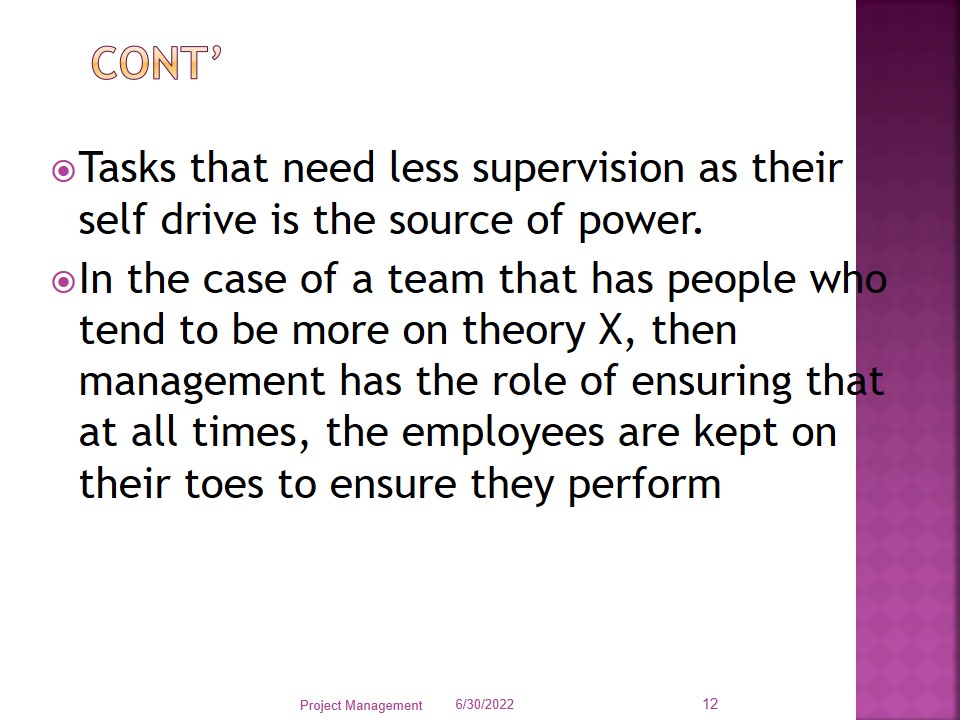
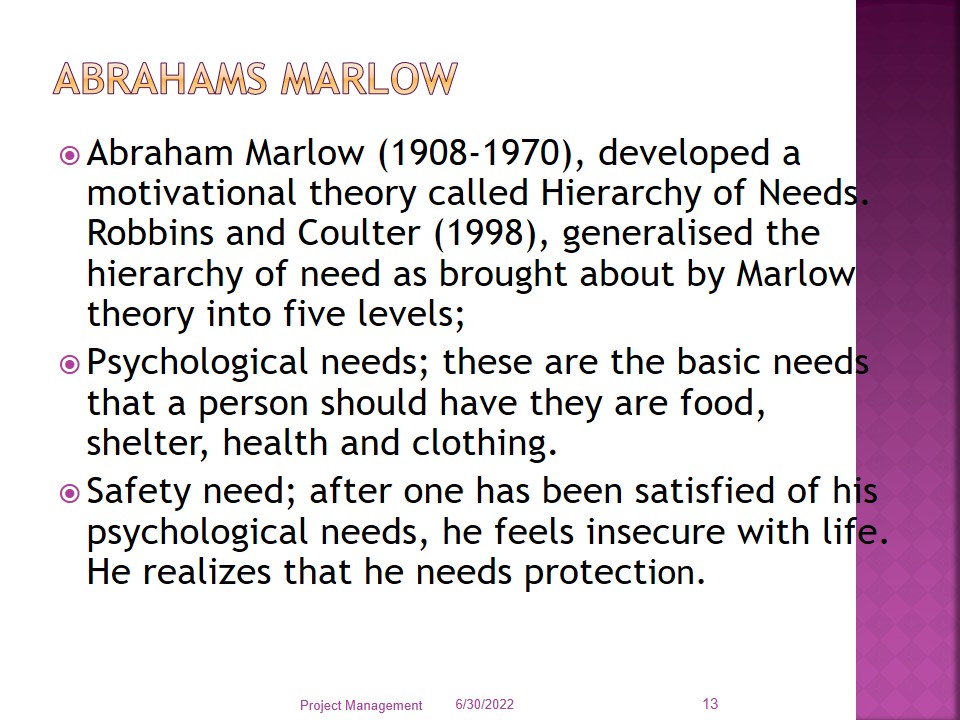
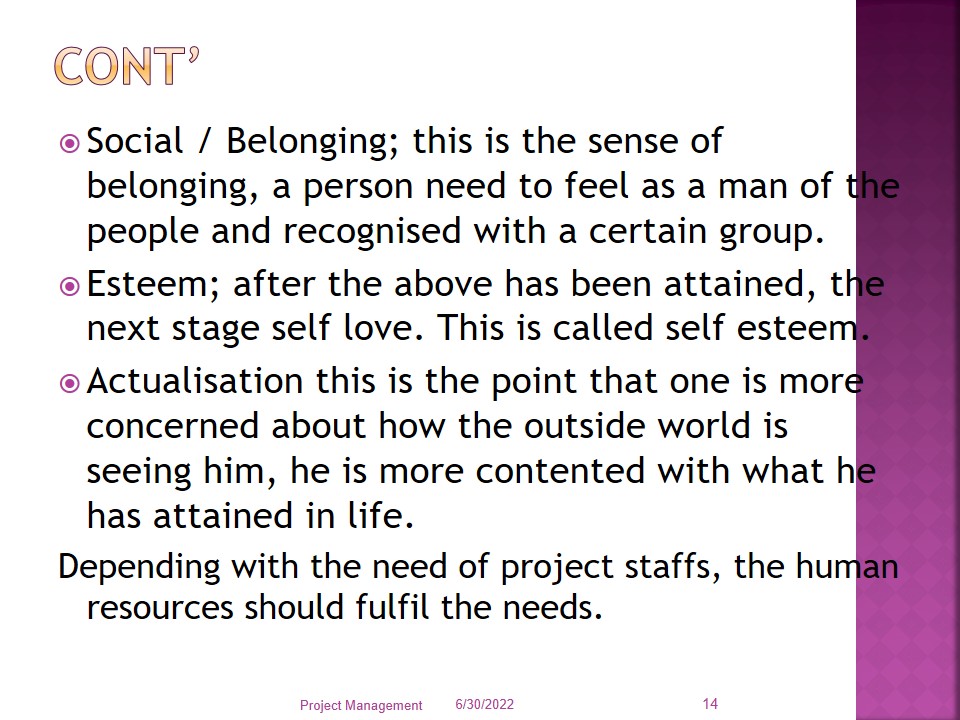
Common Motivators
- There are a number of motivators that an a project leader can apply to motivate its staffs they include:
- Good salaries.
- Flexible working times.
- Involvement in decision making.
- Creating a favourable working environment.
- Delegation and.
- Use of conflict resolution strategies.
The choice of motivation tools that a company adopts depends with the team that a project has, it is the role of management and the team leader to understand his team and ensure he knows the best motivating method that can be effective for the team.
Sometimes the manager may be called to negotiate terms on behalf of the staffs.
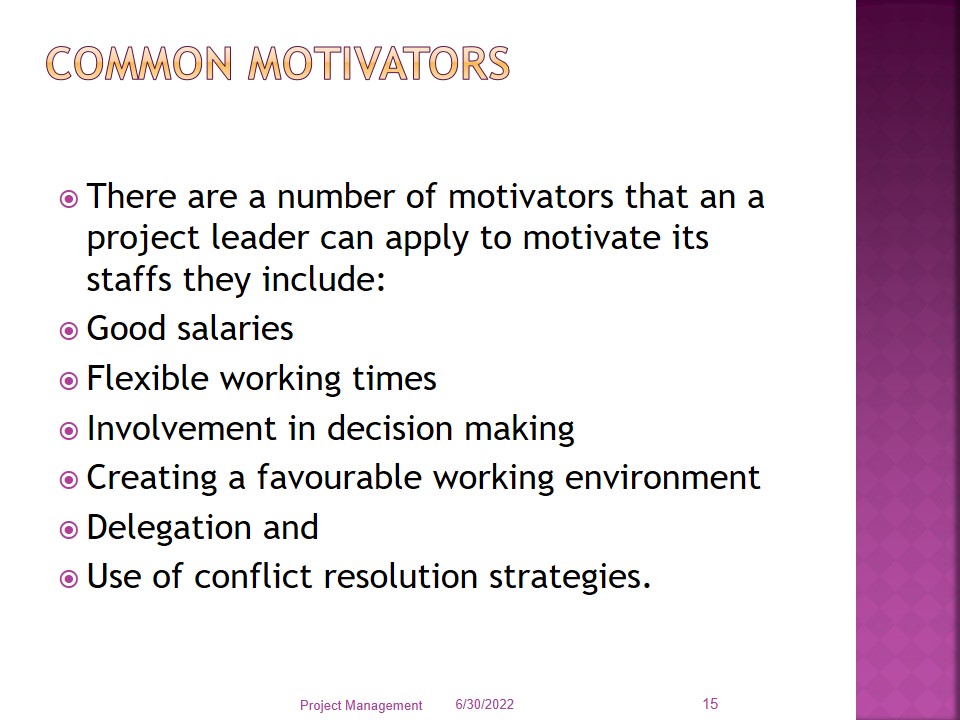
Advantages of motivated team
- Its manages resources effectively making the final cost of a project fair and cost effective.
- Ensures that projects are completed with and within the time and costs allocated.
- Leads to attainment of project goals and objectives.
- Mobilizes resources and improves motivation among team members and staffs (Stephen and Timothy, 2010).
In managing a project, an organization needs dedicated and goal-oriented human resources, they need people who can support the project in different aspects for the good of the organization. An orchestrate team is developed when people with diverse knowledge, experiences, and profession (Stephen and Timothy, 2010).
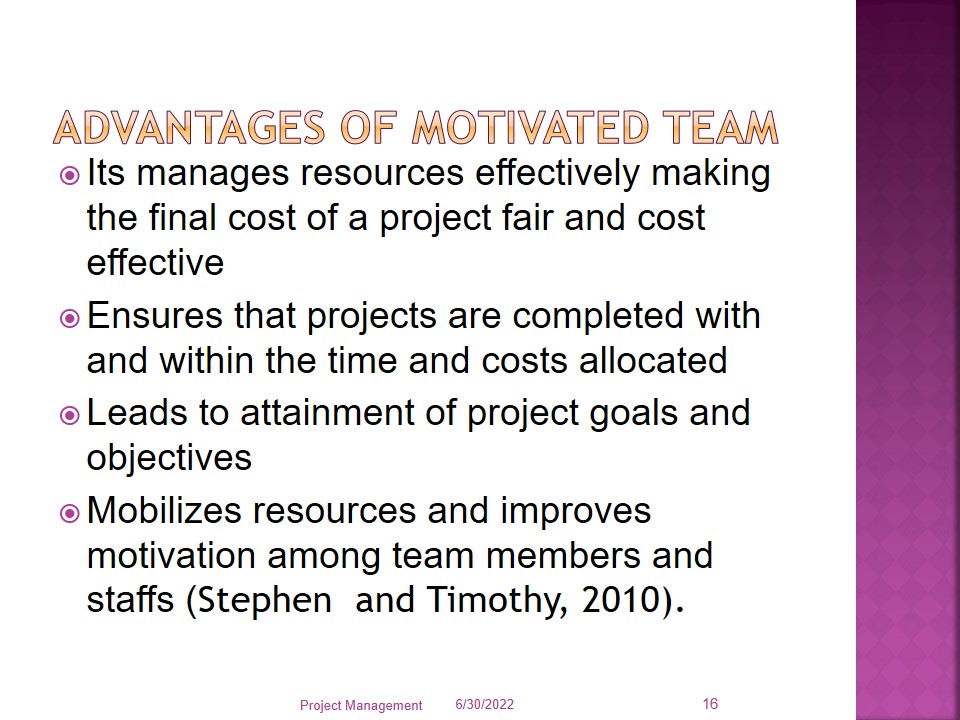
Conclusion
- Projects require both human and physical resources for their completion in time using the allocated resources. Team leaders should ensure they understand their team so that they can have responsive motivational policies and strategies.
- When a team is motivated, then the attainment of the projects goals and objectives is facilitated.
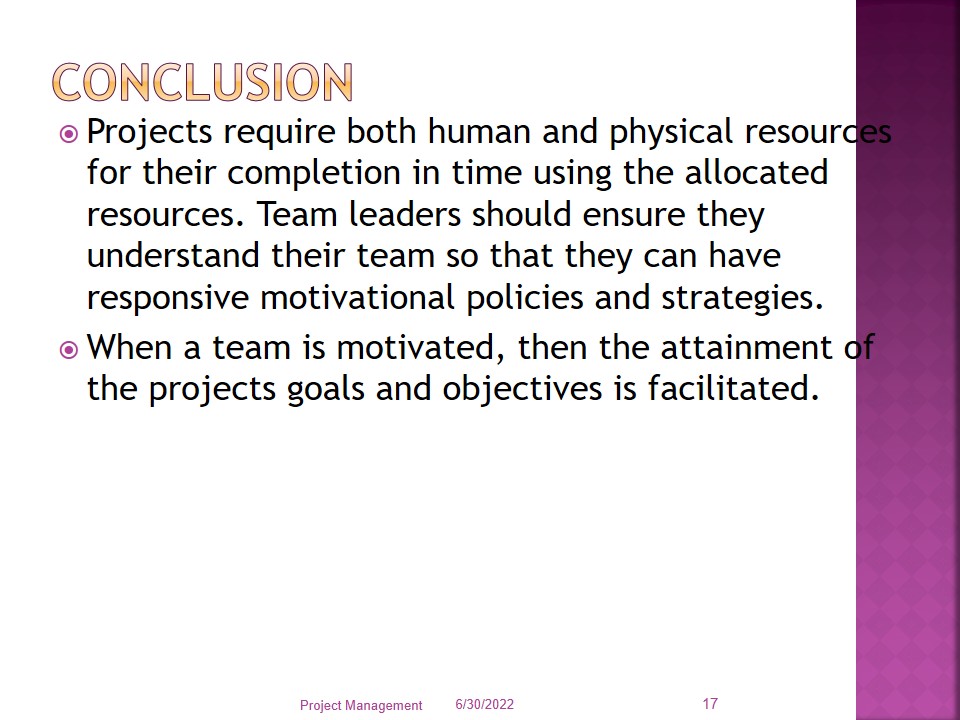
Questions and Answers
- Is there likelihood that the role of a project manager will contradict the roles of human resources in project team management?
- No, the roles are Clearly defined; its worth to note that one attribute of a leader is to be able to manage, lead, and motivate his teams, on the ground, he will be the one responsible for creating an environment favorable for a highly motivated staffs; his roles are distinct from those of human resources
- What are major course of de-motivated project management team?
- The main cause of de-motivation in a team is ineffective human resources management, anytime that personnel team and the project management fail to collaborate to improve the welfare of staffs, then the team is likely to be de-motivated.
Although in literature of motivation, the role is more inclined to be a role of the human resources team, its important to note that the manager on the ground has the role of creating an enabling environment, the environment will be the one that human resources build on. Human resources have the role of looking into pays, pensions and the like.
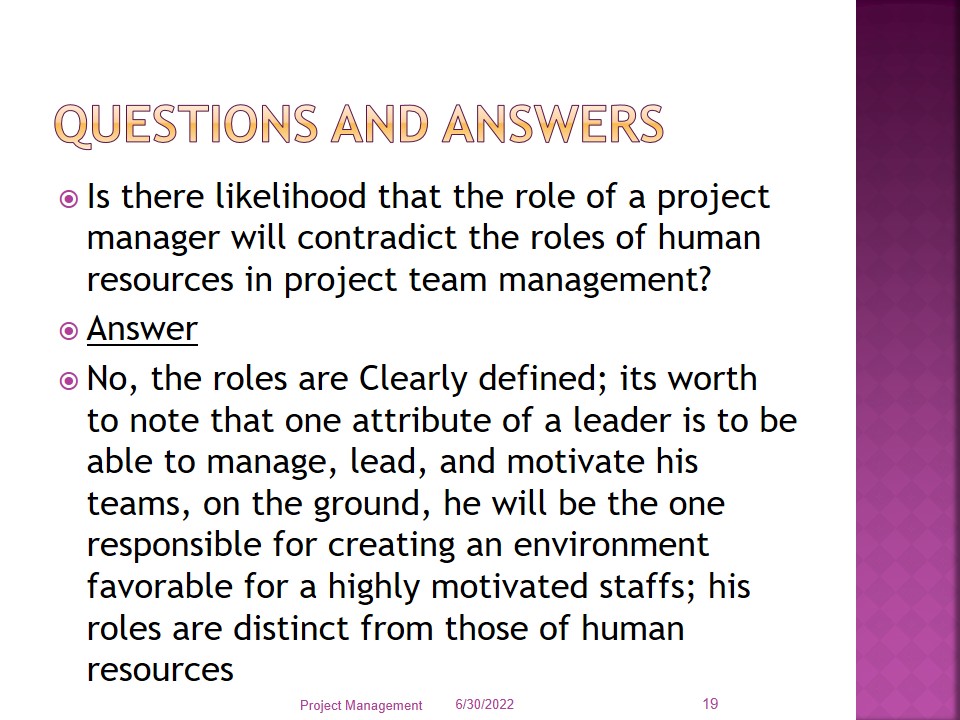
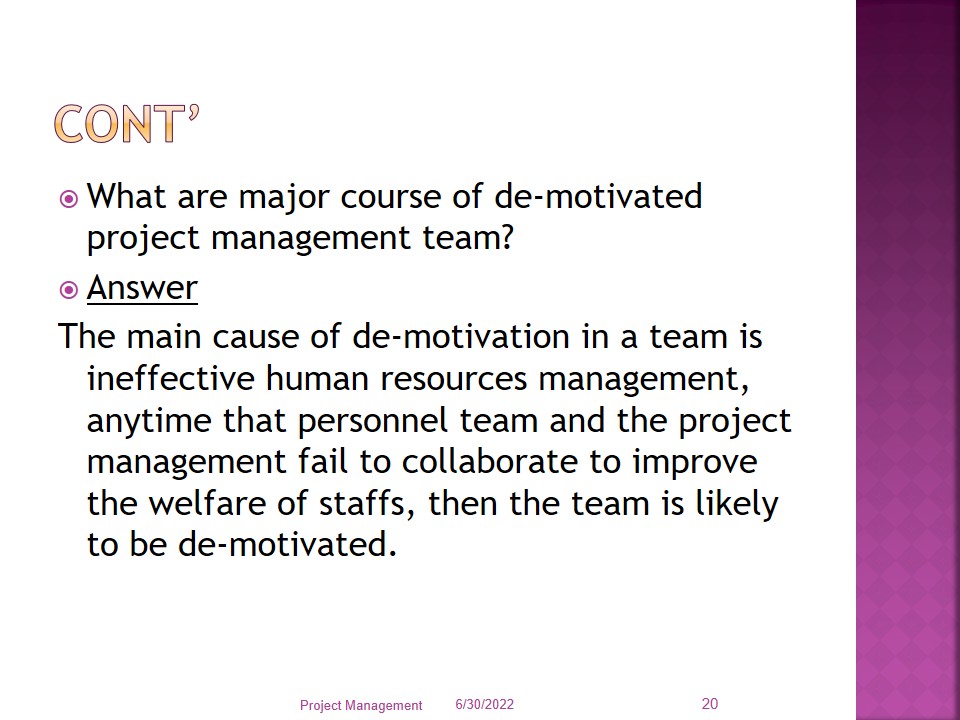
References
Lewis, P.,2004. Team-Based Project Management. Washington: Beard Books.
Stephen P. and Timothy, A.,2010. Essentials of Organizational Behavior. New Jersey: Prentice Hall.